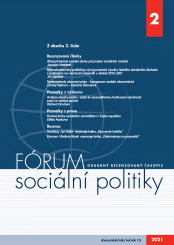(Ne)podmíněné sociální dávky prizmatem sociálních modelů
(Un)conditional social benefits through the prism of welfare regimes
Author(s): Jaroslav VostatekSubject(s): Socio-Economic Research
Published by: Výzkumný ústav práce a sociálních věcí
Keywords: unconditional basic income;universal old-age pension;child benefit;child tax credit;unemployment benefit;
Summary/Abstract: Citizens' initiatives aimed at the introduction of an unconditional basic income comprise a stimulus for a review of the various social systems. Studies by Sapir and his supporters have provided findings which can be summarised in terms of the typology of welfare regimes based on two criteria: efficiency and equity. Similarly, the well-established welfare regimes of (in particular) Esping-Andersen are also significant with respect to social policy. These typologies include a wide range of social security benefits, of which the UBI construct highlights universal monetary benefits as the antithesis of conditional benefits, e.g. social assistance or unemployment benefits. Our paper aims to determine potential leeway for the UBI construct in general and, particularly, in Czechia. Our comparative analysis concentrates on the components of the social systems of Great Britain, Switzerland, Germany, the USA, Finland and Czechia. The comprehensibility and efficiency of the Czech social system requires the division of the Czech „pension insurance“ system into a higher universal pension and a lower earnings-related pension and, conversely, the merger of the child tax credit and the tested child benefit to form a universal child benefit. Neither workers nor the unemployed require a universal benefit.
Journal: Fórum sociální politiky
- Issue Year: 2021
- Issue No: 2
- Page Range: 2-13
- Page Count: 12
- Language: Czech

